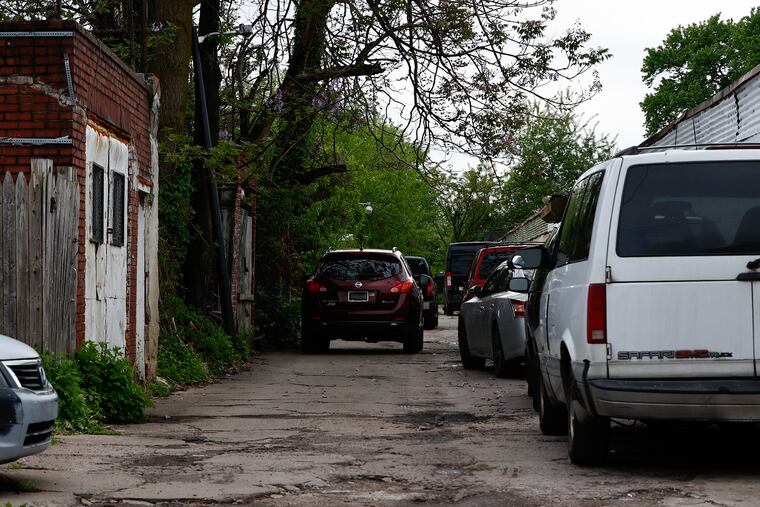Debris, car parts, and fumes: Southwest Philly residents sue an auto body shop they call a yearslong nuisance
“My children talk about us moving all the time,” said one of the plaintiffs

Marceline Dix’s house sits on a quaint strip of rowhouses on the 6000 block of Chester Avenue in Southwest Philadelphia. The location used to be a “beautiful place,” she said, within walking distance of Cobbs Creek Park and Mount Moriah Historic Cemetery and Arboretum.
But in recent years, Dix said, the neighborhood’s sense of community and charm has declined. She blames the presence of an auto body shop behind her house that residents say discards car parts and trash in their backyards and a shared alleyway.
“When we clean up [we know] the junk is going to come back, the cars, the car parts,” said Dix. “We can’t keep up.”
Over the years, residents lodged numerous 311 complaints, asked police to intervene, and called elected officials for help, only to see temporary changes in the shop’s behavior. Last week, Dix, along with neighbors Ramona Monique Bell and Rodney Bell, filed a civil lawsuit in the Philadelphia Court of Common Pleas against White’s Autobody and past and current property owners.
It’s hard for residents to say when the auto body shop became a nuisance because the noise and trash complaints haven’t been consistent over the years, and, according to city records, various people have held vehicle repair licenses for the site over the last 25 years. But since 2007, the shop has received 58 notices of violations from the Department of Licenses and Inspections, according to the suit.
In 2014, Mike Mohjan, also known as Mohammed Al-Khatib, is believed to have started leasing the property to White’s Autobody and Mechanic, according to the suit. West York LLC is believed to have purchased the property in the summer of 2022. The details of the leasing agreement were not immediately clear.
Efforts to reach the shop and property owners for comment were unsuccessful and no lawyers were listed in court documents.
The residents claim White’s Autobody and the property owners have created a private and public nuisance by emitting chemical odors and leaving broken-down cars in residential parking spaces as a form of storage, producing blight in the neighborhood. They worry that the business is creating a fire hazard, citing past auto body shops and scrapyards that have caught fire in residential neighborhoods not that different from theirs.
The suit claims the auto body shop has ignored limitations imposed on its vehicle repair license, which prohibits the business from “spray painting or using any part of the street or sidewalk for the parking or storing of motor vehicles.” According to Dix, the fumes exacerbate her two children’s asthma.
The auto body shop’s presence has also cost residents money, they say. The Bells said they installed bollards and fencing to minimize damage and visibility to their yard but they still can’t enjoy their outdoor space.
“Fundamentally, this case is about a kind of neighboring property, in this case, an auto body business or businesses, that takes our clients’ ability to be in their backyard, to open their windows, to live in an area that is clean of debris and trash, even having some trash thrown in their yards,” said Sari Bernstein, a staff attorney at the Public Interest Law Center, which represents the Chester Avenue residents along with Hausfeld LLP.
When they aren’t hearing noises associated with auto body operations, residents say, they have to deal with loud nighttime parties at the property.
“I don’t know who’s coming behind my house,” said Dix. “My children talk about us moving all the time.”
With more than 99% of the census tract identifying as nonwhite and at least 32% living below the poverty line, residents and their lawyers see the case as an environmental justice issue.
“At this point, there are more than 100 auto body kind of businesses or trunk yards, or scrapyards in vacant lots,” said Bernstein. “That’s just clearly not the case in more affluent areas of the city.”
The suit is about the city holding businesses accountable, said Dix.
Residents are seeking an injunction, demanding that the business end what they consider to be nuisance behavior, as well as compensatory damages for physical and financial harm.